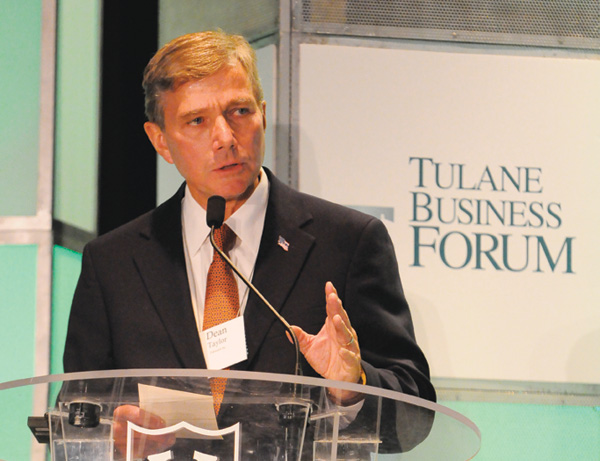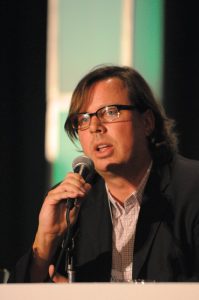
Dean Taylor, chairman of Tidewater, talked about the ways the company distinguishes itself in a commodity industry as this year's luncheon keynote speaker.
The Receivables Exchange was founded to connect investors with small- and mid-size businesses in need of working capital, but according to president and co-founder Nicolas Perkin, the biggest innovation the New Orleans-based company brought to factoring wasn’t creating a transparent marketplace for buyers and sellers of commercial receivables. It was enabling buyers to apply the same risk-management principles to receivables that they apply to the rest of their portfolios.
“Buyers can take 1 percent of 100 different auctions across 100 different industries,” said Perkin. “If you’re going to go buy stock, you’re not going to put all your money in IBM. You don’t do it in any asset class, why would you do it in this asset class? That’s really the fundamental principle of the innovation we think we’ve brought to the table.”
That innovation has helped to fuel an annual growth rate of 400 percent at the Receivables Exchange, which Perkin said is in the early stages of preparing for an IPO.
Perkin talked about the evolution of the Receivables Exchange as part of a panel discussion on alternative capital markets at this year’s Tulane Business Forum. The forum, an annual presentation of the Tulane Association of Business Alumni (TABA), took place at the Sheraton New Orleans Hotel on Oct. 8. This year’s forum focused on the theme “Leveraging Corporate Resources,” and more than 650 people attended to hear some of the creative ways that businesses and business leaders are doing more with less.
Robbie Vitrano, chairman and co-founder of marketing firm Trumpet, told the story of Naked Pizza, the New Orleansbased healthy pizza chain that has used social media to grow from one store to an international brand with 400 locations in development.
“We used [social media] as a way to get people interested in our idea, primarily using Twitter and Facebook to distribute this conversation,” said Vitrano, a partner in the company. “It allowed for media to get a hold of this idea and start to distribute it. While we were just one location, were were inthe Wall Street Journal, the New York Times and blogs around the world. In essence, it allowed us to validate the concept.”
The forum kicked off with a presentation by Charles N. Kahn III, president and CEO of the Federation of American Hospitals, on what to expect from health care reform. Kahn was followed by Vitrano and John Winsor, CEO of Victors & Spoils, a marketing firm based in Boulder, Colo., that, like Trumpet, is using social media technology to accomplish things that previously would have been unthinkable for a small agency.
Joining Perkin on the alternative capital markets panel were J. Marshall Page III, a partner at Jones Walker, and Christopher J. Perry, president and global head of Thomson Reuters Trading Focus Accounts. The panel was moderated by Peter Ricchiuti, assistant dean at the Freeman School.
David Brain (A&S ’78, MBA ’79), president and CEO of Entertainment Properties Trust, a NYSE-traded REIT that focuses on megaplex movie theatres and entertainment retail centers, followed the capital markets discussion with a presentation on off-balance-sheet financing.
The forum concluded with a luncheon keynote presentation by Dean E. Taylor (A&S ’71), chairman, president and CEO of Tidewater Inc. Taylor’s presentation was on distinguishing your company in a commodity industry, and one of the key elements to achieve that goal, he said, is having the right people in place. To illustrate that point, Taylor showed a video which told the story of Tidewater’s Damon B. Bankston supply boat, whose crew rescued 115 people from the waters of the Gulf of Mexico following the Deepwater Horizon explosion and fire.
“That’s something about which I’m immensely proud,” Taylor said. “They didn’t do it for glory. They didn’t do it for any other reason than it was the right thing to do. That’s typical of so many people in our industry that do what they do because it’s the right thing to do.”


